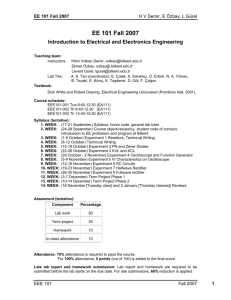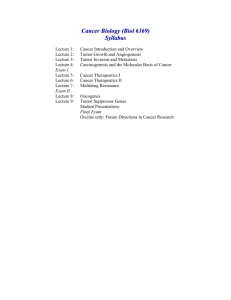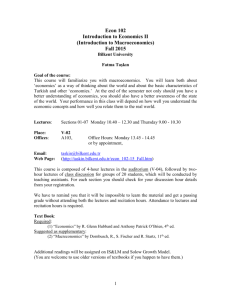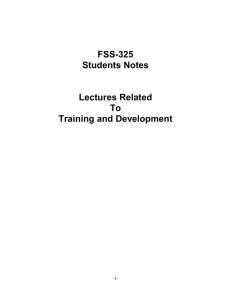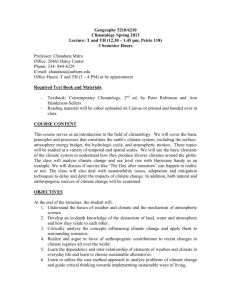Econ 102-01 Principles of Macroeconomics - Taskin
advertisement
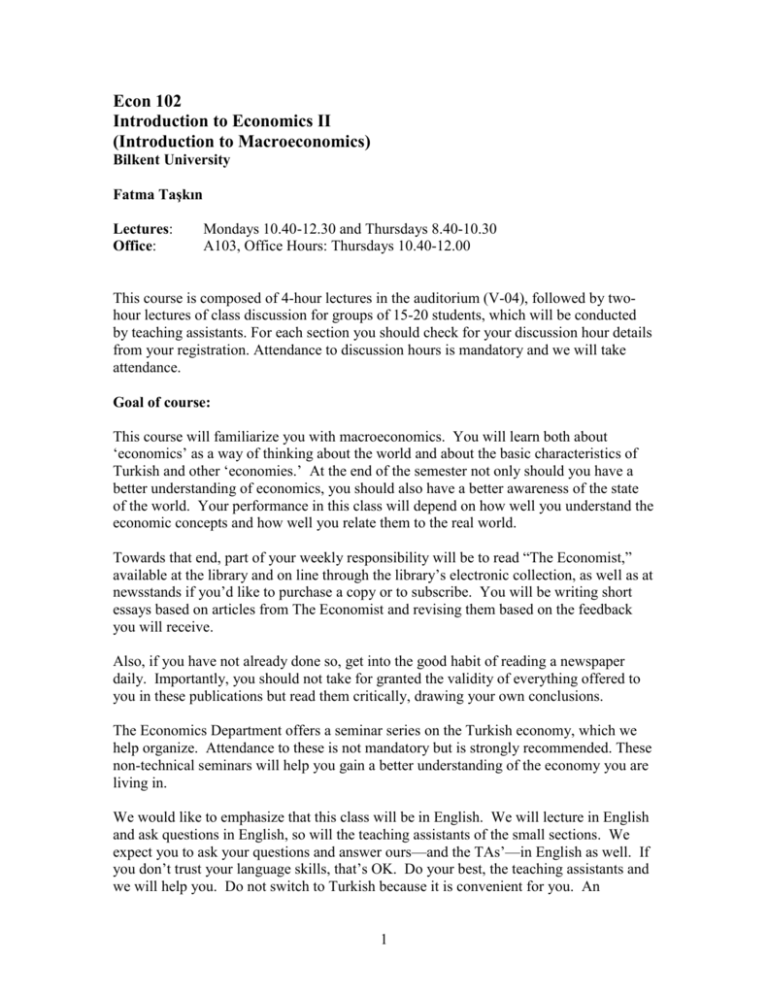
Econ 102 Introduction to Economics II (Introduction to Macroeconomics) Bilkent University Fatma Taşkın Lectures: Office: Mondays 10.40-12.30 and Thursdays 8.40-10.30 A103, Office Hours: Thursdays 10.40-12.00 This course is composed of 4-hour lectures in the auditorium (V-04), followed by twohour lectures of class discussion for groups of 15-20 students, which will be conducted by teaching assistants. For each section you should check for your discussion hour details from your registration. Attendance to discussion hours is mandatory and we will take attendance. Goal of course: This course will familiarize you with macroeconomics. You will learn both about ‘economics’ as a way of thinking about the world and about the basic characteristics of Turkish and other ‘economies.’ At the end of the semester not only should you have a better understanding of economics, you should also have a better awareness of the state of the world. Your performance in this class will depend on how well you understand the economic concepts and how well you relate them to the real world. Towards that end, part of your weekly responsibility will be to read “The Economist,” available at the library and on line through the library’s electronic collection, as well as at newsstands if you’d like to purchase a copy or to subscribe. You will be writing short essays based on articles from The Economist and revising them based on the feedback you will receive. Also, if you have not already done so, get into the good habit of reading a newspaper daily. Importantly, you should not take for granted the validity of everything offered to you in these publications but read them critically, drawing your own conclusions. The Economics Department offers a seminar series on the Turkish economy, which we help organize. Attendance to these is not mandatory but is strongly recommended. These non-technical seminars will help you gain a better understanding of the economy you are living in. We would like to emphasize that this class will be in English. We will lecture in English and ask questions in English, so will the teaching assistants of the small sections. We expect you to ask your questions and answer ours—and the TAs’—in English as well. If you don’t trust your language skills, that’s OK. Do your best, the teaching assistants and we will help you. Do not switch to Turkish because it is convenient for you. An 1 important part of your Bilkent education is acquiring fluency in English which you can only do by using the language. While part of your grade is based on participation attendance to our lectures are not mandatory. We will make this class interesting and rewarding for you but, if you feel our lectures are not worth your time, we will not force you to come to class. Having said that, we should also point out that there is a high correlation between attendance and performance. (People who come to class actually learn something.) If you are not planning to attend the lectures, we recommend not taking this class. Text Book: “Economics” by R. Glenn Hubbard and Anthony Patrick O’Brien, 4th ed. (If you have the older edition, you may still continue using it, however, you should take a look and see what the minor differences are) Grading Your course grade will be a weighted average of homeworks, essays, participation, and exams, with the weights as follows: Participation Quizzes Homeworks Midterm Final 10% 10% 15% 30% 35% Note on final exams and letter grades: It is important to note that although the weight of the final exam is 35%, those who get a grade below 40 in the final exam will fail regardless of their previous grades. Overall grades will reflect your performance in each assessment tool and how much you have learned. Note on exam grading: It is possible to get negative grades from questions. Not answering a question or making reasonable mistakes is fine. Writing nonsense or proudly displaying a lack of understanding of basic definitions (such as defining disinflation as falling prices) is not. These instances will lead to negative grades from those questions. Note on exams: The exam schedule is set as follows. Make sure you arrange your personal schedule accordingly. THERE WILL BE NO MAKE-UP EXAMS given without documented medical and other emergencies. The mid-term and final exams will be comprehensive and will include material that is covered in lectures and discussion lectures up to date. THERE WILL BE NO CELL PHONES ALLOWED IN THE EXAM ROOMS IN MIDTERM AND FINAL EXAMS. Note on homework: There will be an homework every other week. Each homework has equal weight. -The homework will be assigned on Thursday and will be turn in on the next Thursday. 2 - The homework has to be typed, and submitted via Turnitin. You will receive information on how to do this. Since your homeworks will be electronically submitted and Turnitin will be closed at noon on Thursday you must make sure to submit your work before the deadline. - Regularly you will be asked to write one page essays based on the articles in The Economist. Please pay attention to detail when handing your essays in. Think twice before handing in work with your name on it: Do you want to be known as the person who produced that piece? - You will have irregularly spaced quizzes in your recitation hours. The quizzes will have questions almost identical to what you worked on in your homeworks. The aim is to encourage you to think about your homework questions (we think a lot when we prepare them) and make sure that you understand what you do in homeworks. Note on Discussion Participation: Attendance to discussion hours is mandatory. Participation in class discussions is required. Please note that participation is different than attendance. Your participation will be based on the meaningful questions you ask, the thoughtful answers you provide and your contribution to class discussions in you small group sections. -To prepare for the class discussion you must do the readings. There will also be regular homeworks to be done before the recitation session. The homework will help you think about the relevant ideas and apply these to the real world. -Note that if you don’t do the readings and the homework and don’t follow the world around you (by reading newspapers, The Economist, etc.) you won’t be able to contribute to and benefit from the class discussion. Take this class only if you are going to extend the effort to improve yourself. Honesty: There is zero tolerance for any kind of cheating, including plagiarism, and giving answers and writting that does not belong to you as your own work. We expect you to be punctual and respect the right of others to listen to class during the lectures. TURNING OFF YOUR CELL PHONE DURING CLASS is expected. Information dissemination: The course relationed announcements and electronic documents will be posted on the course web-page via Moodle services and as well as Fatma Taskin’s web page, (www.bilkent.edu.tr/~taskin/Econ102.htm) For your questions come to our offices during office hours set aside to answer your questions and to assist you. If you can not make itto these scheduled office hours please email us to schedule an appointment. 3 Tentative plan for the course: Week Week of Chapter Topic 1 Sept. 17 19 What is Macroeconomics? Measuring GDP, Inflation. 2 Sept. 24 19 Nominal and Real GDP, Growth 3 Oct. 1 20 Unemployment and Inflation 4 Oct. 8 21 Economic growth and Financial System. 5 Oct. 15 22 Economic Growth: Sources and Policies 6 Oct. 22 23 Aggregate Expenditure and Output: GDP multiplier and deriving AD 7 Oct. 29 24 Aggregate Demand and Aggregate Supply Analysis 8 Nov. 5 27 Fiscal Policy 9 Nov. 12 Fiscal Deficit and Debt Nov. 15, MIDTERM EXAM at 17.40-19.30. 10 Nov. 19 25 Money and Banks, Bank’s Balance Sheet 11 Nov.26 26 Monetary Policy 12 Dec. 3 28 Phillips Cutve 13 Dec. 10 29 Open Economy 14 Dec. 17 30 Open Economy 15 Dec. 24 Review Make sure to read The Economist of the week and to follow a daily newspaper as well as doing the readings from the textbook. It is imperative that you are informed of what is going on in Turkey and in the world to make sense of this class. 4


